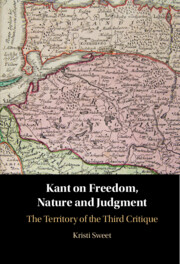Book contents
- Kant on Freedom, Nature, and Judgment
- Kant on Freedom, Nature, and Judgment
- Copyright page
- Dedication
- Epigraph
- Contents
- Acknowledgments
- Abbreviations
- Introduction
- 1 Reason, Hope, and Territory
- 2 Reflection, Purposiveness, Metaphysics
- 3 “Life” and the Ideal of Beauty
- 4 The Sensus Communis and the Ground of the Critical System
- 5 Genius, Aesthetic Ideas, and a Spiritualized Natural Order
- 6 The Domain of Nature as System: Ends
- 7 Hope and Faith: God in the Critique of Teleological Judgment
- Conclusion
- Bibliography
- Index
2 - Reflection, Purposiveness, Metaphysics
Published online by Cambridge University Press: 07 August 2023
- Kant on Freedom, Nature, and Judgment
- Kant on Freedom, Nature, and Judgment
- Copyright page
- Dedication
- Epigraph
- Contents
- Acknowledgments
- Abbreviations
- Introduction
- 1 Reason, Hope, and Territory
- 2 Reflection, Purposiveness, Metaphysics
- 3 “Life” and the Ideal of Beauty
- 4 The Sensus Communis and the Ground of the Critical System
- 5 Genius, Aesthetic Ideas, and a Spiritualized Natural Order
- 6 The Domain of Nature as System: Ends
- 7 Hope and Faith: God in the Critique of Teleological Judgment
- Conclusion
- Bibliography
- Index
Summary
This chapter examines the significance of the two principal features of the faculty of judgment: its characteristic activity of reflection and its constitutive principle of purposiveness. It directly engages the metaphysical resonances of Kant’s text insofar as it seeks a supersensible substratum to nature. Through an analysis of objective purposiveness, it argues that what appears to us out in the territory appears to us in its possibility. In this, what appears to us is the very ground of appearance itself, which is seen to be a kind of fundamental ordering to all appearance. It further argues that the pleasure of subjective purposiveness yields a more expansive, cosmic sense of human beings’ belonging to or being fit for the world. The things that are out there in the world are, in their structure, not only ordered, but ordered for us. Lastly, this chapter suggests that our relation to this ordering is interpretative, thus opening a future for metaphysical inquiry that is rooted not in speculation, but in reflection.
- Type
- Chapter
- Information
- Kant on Freedom, Nature, and JudgmentThe Territory of the Third <i>Critique</i>, pp. 56 - 80Publisher: Cambridge University PressPrint publication year: 2023

